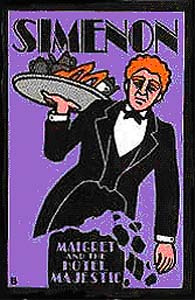Georges Simenon - Maigret and the Death of a Harbor-Master
Here you can read online Georges Simenon - Maigret and the Death of a Harbor-Master full text of the book (entire story) in english for free. Download pdf and epub, get meaning, cover and reviews about this ebook. year: 1989, publisher: Mariner Books, genre: Detective and thriller. Description of the work, (preface) as well as reviews are available. Best literature library LitArk.com created for fans of good reading and offers a wide selection of genres:
Romance novel
Science fiction
Adventure
Detective
Science
History
Home and family
Prose
Art
Politics
Computer
Non-fiction
Religion
Business
Children
Humor
Choose a favorite category and find really read worthwhile books. Enjoy immersion in the world of imagination, feel the emotions of the characters or learn something new for yourself, make an fascinating discovery.
- Book:Maigret and the Death of a Harbor-Master
- Author:
- Publisher:Mariner Books
- Genre:
- Year:1989
- Rating:4 / 5
- Favourites:Add to favourites
- Your mark:
- 80
- 1
- 2
- 3
- 4
- 5
Maigret and the Death of a Harbor-Master: summary, description and annotation
We offer to read an annotation, description, summary or preface (depends on what the author of the book "Maigret and the Death of a Harbor-Master" wrote himself). If you haven't found the necessary information about the book — write in the comments, we will try to find it.
Maigret and the Death of a Harbor-Master — read online for free the complete book (whole text) full work
Below is the text of the book, divided by pages. System saving the place of the last page read, allows you to conveniently read the book "Maigret and the Death of a Harbor-Master" online for free, without having to search again every time where you left off. Put a bookmark, and you can go to the page where you finished reading at any time.
Font size:
Interval:
Bookmark:
Maigret
and the
Death of a Harbormaster
Le Port des Brumes
the 15th episode in the Maigret Saga
1932
Georges Simenon
translated by Stuart Gilbert
A 3S digital back-up edition 1.0
valid XHTML 1.0 strict
Contents
Georges Simenon - Maigret and M. Labb
(dual edition, with The Man From Everywhere )
Le Port des Brumes : Translated From The French By Stuart Gilbert
Harcourt, Brace And Company New York
Copyright, 1942, By Harcourt, Brace And Company, Inc.
All rights reserved, including the right to reproduce this book or portions thereof in any form.
first American edition
PRINTED IN THE UNITED STATES OF AMERICA
1.
The Cat in the House
WHEN the Cherbourg train left Paris, just before three, the cool clear sunlight of an October afternoon still bathed the busy streets. Thirty miles out, when it was nearing Nantes, the lights had been turned on in the compartments. Half an hour later, when the train reached Evreux, it was quite dark. Across the dripping windows nothing could now be seen but a dense fog, through which now and again a railway signal glimmered for a moment, fringed by iridescent sheen.
Slumped in a corner seat, his head resting on the padded back, Maigret watched with half-closed eyes the oddly assorted couple facing him.
Captain Joris was asleep. On that enigmatic, shaven head of his the wig had slipped askew; his clothes were rumpled, travel-stained.
Julie was firmly clutching her bag, a cheap affair in imitation crocodile-skin, and gazing straight in front of her. Tired though she was, she was obviously determined not to give way to fatigue, and to keep up appearances.
Joris. Julie. A puzzling pair.
It was nothing new for Inspector Maigret to have people crashing in like thisout of the blue, so to speak into his life, and monopolizing it for days, weeks, or even months on end; only to relapse once more into the common herd of nondescripts.
The rumbling wheels set a rhythm to his thoughts, the thoughts that always haunted him at the start of an investigation. Would it be an interesting case or mere routine-work; dull or eventful?
As Maigret gazed at Joris a smile hovered on his lips. An odd bloke! Bloke came naturally, for at Headquarters during the last five days this stalwart, stockily built seaman in the early fifties had been known merely as The Bloke.
Noticing a man behaving in a peculiar manner, dodging in and out amongst the traffic, a constable on duty on the Central Boulevards had taken him into custody. He had been questioned in French. No answer. Seven or eight foreign languages were tried without success. A deaf-mute expert likewise had drawn blank.
A lunatic? He had been searched in Maigrets office. His suit and undergarments were brand-new. Tailors and shirt-makers names had been cut out. No identity papers. No wallet. But, tucked into a coat pocket, five crisp thousand-franc notes.
The inquiry had got on everybodys nerves. Police registers and anthropomtrie records had been ransacked. Telegrams dispatched all over France, and abroad. And from morn till night, under a perpetual cross-fire of questions, The Bloke had just gone on smiling, quite happily, to himself. Throughout the ordeal he had not once protested, never shown emotion; sometimes he seemed to make an effort to remember, but gave in almost at once.
Loss of memory? The wig had fallen off his head, and it was found that a bullet had perforated the top of the mans skull, not more than two months previously. The doctors were all admiration; rarely had they seen a damaged skull repaired so neatly.
A new batch of telegrams went out, to hospitals and nursing-homes in France, Belgium, Germany, and Holland. Five strenuous days had been wasted in inquiries on these lines.
Chemical analysis of the stains on the mans clothes and the dust in his pockets had given odd results. Some traces had been found of a fishy substance used as sardine bait and peculiar to the northern coast of Norway, where cod-roes are dried and ground up for this purpose.
Did this mean he came from those parts? Was he a Scandinavian? There were indications that he had made a long railway journey. But how could he have managed it alone, unable to utter a word, and wearing that queer, bewildered air which made him so conspicuous?
His photograph was published in the papers. A wire came from Ouistreham: Unknown man identified . It was followed up by a young woman, who burst into Maigrets office. A young woman with a haggard face, clumsily rouged and powdered; Julie Legrand, The Blokes housekeeper.
So now he was The Bloke no longer; he had a name, a place in the community. He was Yves Joris, a retired sea-captain, now harbor-master at Ouistreham.
Julie burst into tears. Julie simply couldnt understand! When she implored him to speak, the man merely gazed at her good-humoredly, as he did at everyone else.
Captain Joris had disappeared from Ouistreham, a small port on the north coast between Trouville and Cherbourg, on September 16. It was now the end of October.
What had he been doing during those six unaccountable weeks?
He went to the ship-canal, Julie explained, to take his turn of duty at the lock. High water was late that night. I didnt wait up for him. Next morning, when I went to his bedroom, he wasnt there.
The night had been foggy. He might have missed his footing and fallen into the lock. It had been dragged without result. Another theory had then been put forward: perhaps hed had a sudden fancy for a jaunt to Paris, or elsewhere.
Lisieux. Three minutes stop.
Maigret stepped out on to the platform to stretch his legs. He filled his pipe again. He had smoked so many pipes since leaving Paris that you could have cut the air in the compartment with a knife.
Take your seats.
Julie had seized the opportunity to dab her nose with her puff. Her eyes were still red with weeping.
Curious! There were moments when she looked quite attractive, chic almost by Parisian standards; others when, though one couldnt say just why, her peasant origin showed definitely through.
She straightened the wig on the Captains head, casting a glance at Maigret as though to say, He has only me to look after him, you know. For Joris had no family. For years he had lived alone, except for Julie, whom he called his housekeeper. She always referred to him as her gentleman.
He treated me like a daughter.
A quiet man. No enemies; no love-affairs, no vices. After knocking about the world for thirty years, he had settled down for good, it seemed, to blameless domesticity. But he couldnt resign himself to idleness. After giving up the sea he had applied for the post of harbor-master at Ouistreham. He had built a little house there.
Then one fine eveningthe sixteenth of September hed vanished from the face of the earth; only to reappear in Paris six weeks later, and in what a state!
Julie had been quite shocked at finding him dressed in a ready-made gray lounge suit. Never before had she seen him in anything but uniform.
She was obviously nervous. Something was weighing on her mind. Every time she turned towards the Captain her look expressed compassion, but something else: an obscure rankling apprehension. It was heher gentlemansure enough. And yet, somehow, it wasnt altogether he!
Hell recover, wont he? Luckily Im good at nursing.
The moisture on the windows was condensing into turbid drops of water. The Inspectors massive head was gently swaying from side to side with the movement of the train. And all the time, placidly, he was observing the two in front of him: Julie, who had pointed out that they might just as well have traveled Third, as she always did; Joris, who was waking up and gazing dreamily about him.
Next pageFont size:
Interval:
Bookmark:
Similar books «Maigret and the Death of a Harbor-Master»
Look at similar books to Maigret and the Death of a Harbor-Master. We have selected literature similar in name and meaning in the hope of providing readers with more options to find new, interesting, not yet read works.
Discussion, reviews of the book Maigret and the Death of a Harbor-Master and just readers' own opinions. Leave your comments, write what you think about the work, its meaning or the main characters. Specify what exactly you liked and what you didn't like, and why you think so.












